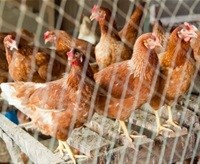SA poultry industry serious about transformation
Justice Zotwa, chairman of the SAPA Transformation Committee, says the process began in 2003 with the establishment of the Developing Poultry Farmers Association (DPFO) as one of the organisations that make up the 111-year-old poultry association.
A series of resolutions

"The DPFO's mandate was to identify emerging farmers from previously marginalised groups that sought to enter the poultry farming sector and create a bridge between them and the more, established commercial poultry farming sector, as well as promote active engagement with government to find ways of creating a more inclusive and sustainable industry," says Zotwa. "While in the beginning the DPFO was tasked with identifying and mentoring emerging farmers, today it is responsible for driving SAPA's organisational transformation as well as in the industry itself."
Zotwa says that a series of resolutions have been moved for adoption at SAPA's annual AVI Africa Congress at Emperor's Palace in Kempton Park from 23 to 25 June 2015.
"The Management Committee, SAPA's current highest decision-making body, now has four members drawn from groups designated as historically disadvantaged, whereas in the past, it only had one," he says. "SAPA's new constitution proposes a board consisting of eight directors, of which four directors will be historically disadvantaged individuals while the remaining four will be drawn from the traditional bigger industry players. SAPA will also be ensuring that one of its executives focus on transformation as a key area of the organisation and its future."
The progress of transformation
Zotwa says that as far as the overall progress of transformation within a broader industry context is concerned, the SAPA Transformation Committee has been tasked with monitoring, recording and reporting on this on a regular basis.
"Companies submit their transformation activities and plans to the committee, which are then documented for reporting to stakeholders. The Transformation Committee also acts as a link between companies looking for transformation opportunities and beneficiaries," he says.
Becoming BEE compliant
Zotwa said with the options of seven pillars of BBBEE available to companies to implement, there can be little excuse for poultry companies not to embark on initiatives aimed at bringing those previously excluded from the industry into the economic mainstream of poultry production.
"A number of the bigger companies in the poultry industry have made significant strides in transforming their operations to become BEE compliant, with considerable success achieved in this regard," he said. "We've seen the four major JSE-listed poultry producers actively subscribe to transformation by implementing preferential procurement, skills development and the transfer of skills to black employees, assisting with the development of black owned enterprises, and socio-economic development investments and donations."
He added that the committee would like to see other big players document their status and upcoming transformation plans that would lead to a continuous improvement in the overall picture of an economically inclusive poultry industry that's open to all South Africans.
"This requires a frank assessment of what they've done so far, what they intend to do and identify the gaps," he said. "The DPFO, together with SAPA's Transformation Committee, will then be able to assist in identifying new opportunities for improvement."